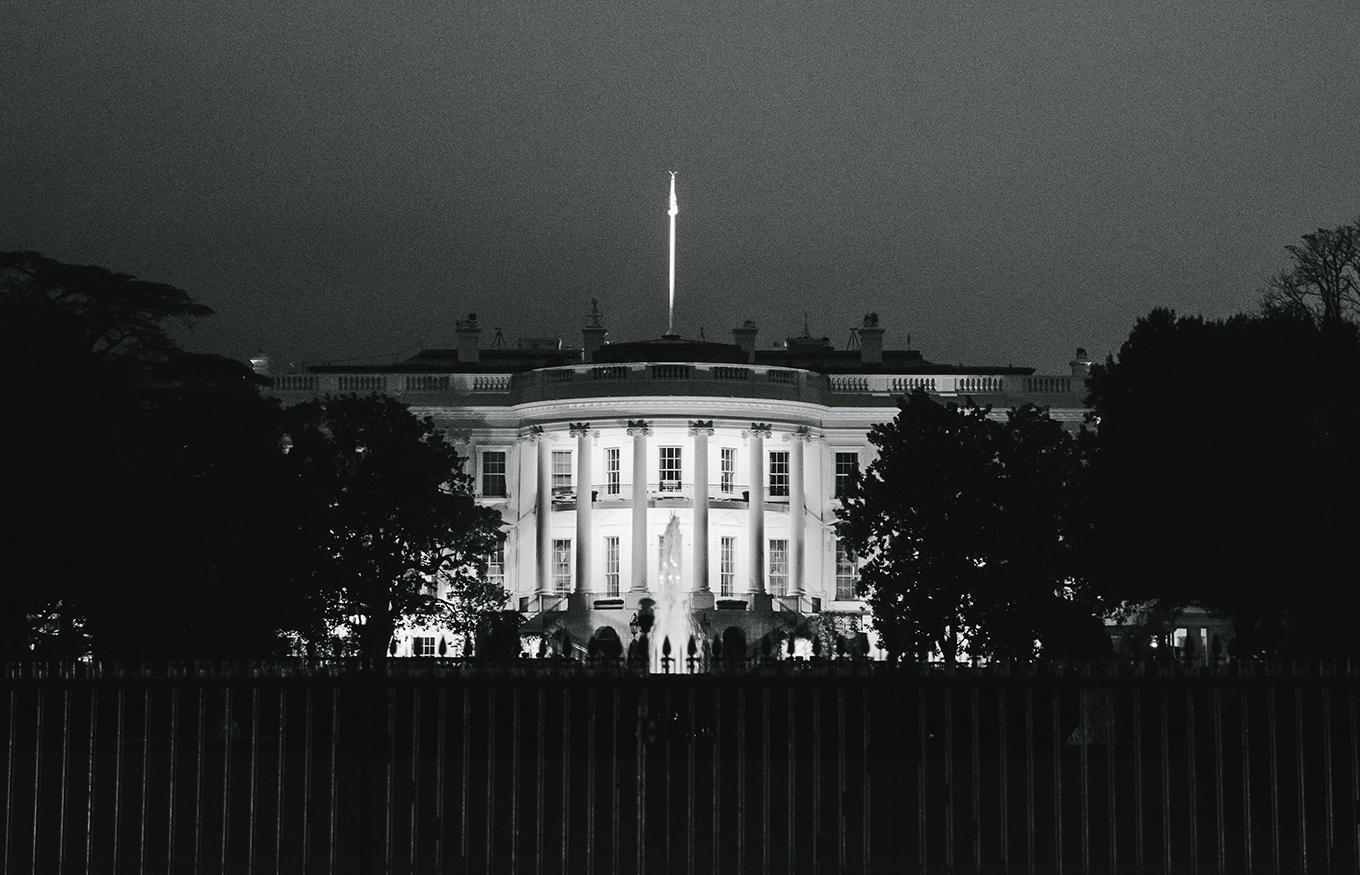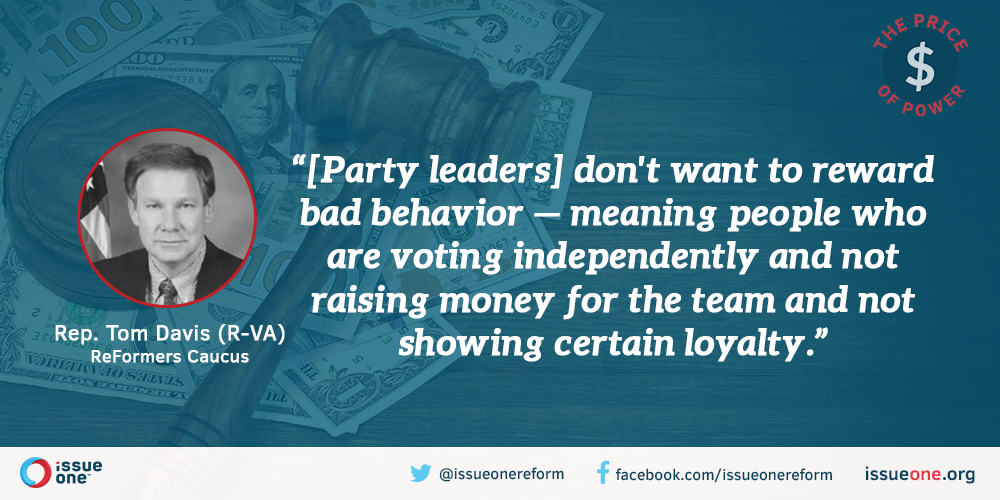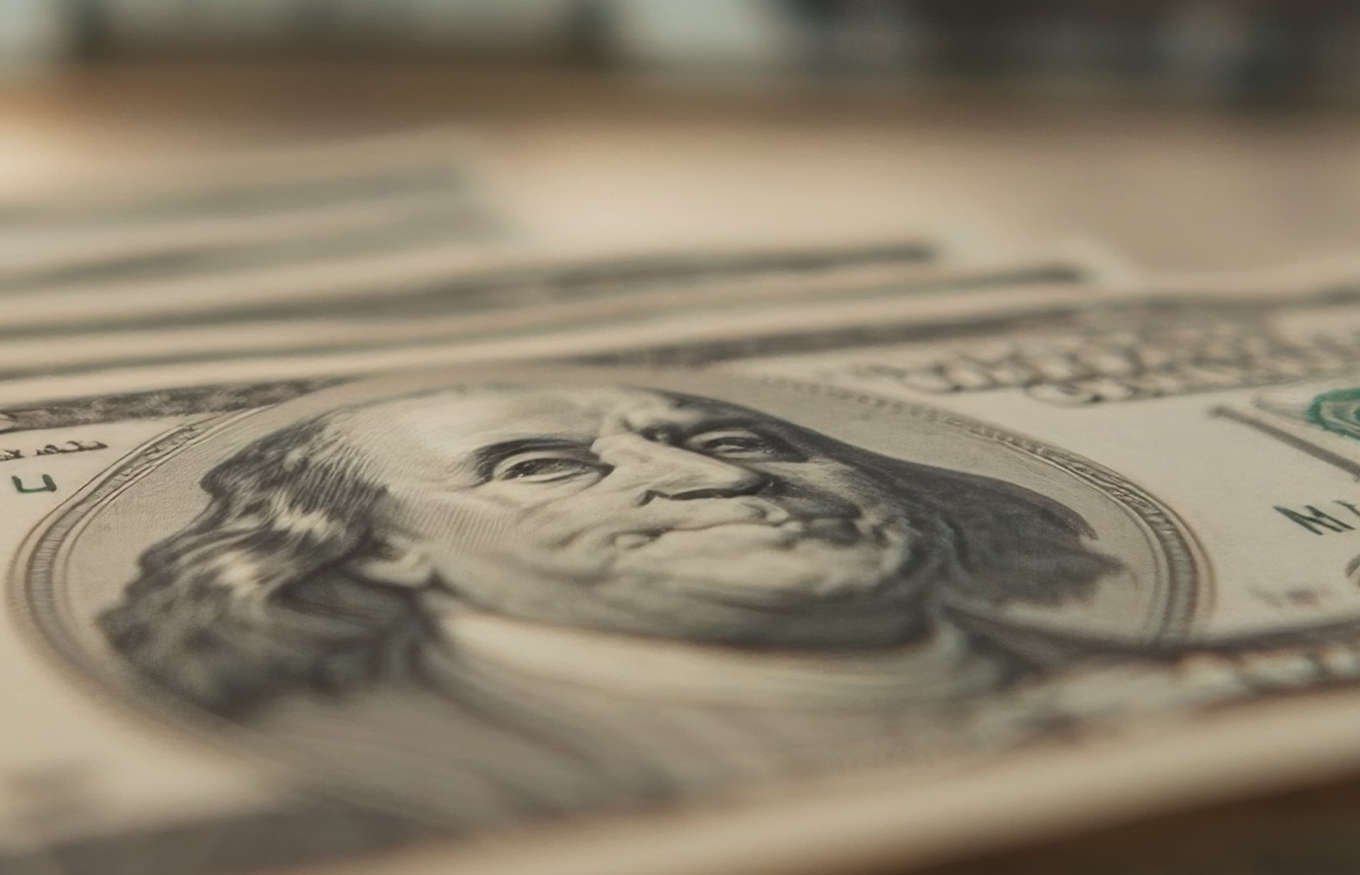To help inform Issue One’s landmark report, “The Price of Power,” we interviewed several members of our bipartisan ReFormers Caucus at-length about their experiences with fundraising and concerns with the “committee tax” imposed on lawmakers.
Every Tuesday and Thursday over the next few weeks, we will release edited excerpts of those conversations with these former lawmakers to supplement and expand on the disturbing picture the report painted: that of a broken democracy, which Congress itself must act to fix.
***
Tom Davis, a member of Issue One’s ReFormers Caucus, is a Republican who represented Virginia’s 11th Congressional District in the U.S. House of Representatives from January 1995 until November 2008. Davis also served as the chairman of the National Republican Congressional Committee ahead of the 2000 and 2002 elections.
We are working on a report about the role of party dues and fundraising as it relates to different committees, committee assignments and chairmanships. What’s your impression of how committee assignments and chairmanships are awarded?
Committee assignments and committee chairmanships are doled out based on a number of factors. One is: ‘Will this committee assignment help this member get re-elected if they’re in a marginal district?’ Another is: ‘Have they shown enough fealty to the party leadership and contributed to the team?’ Basically, you don’t want to reward bad behavior — meaning people who are voting independently and not raising money for the team and not showing certain loyalty.
What are the ways that a committee assignment can help with a re-election?
For example, if you’re on an ‘A’ committee such as Energy and Commerce, Financial Services or Ways and Means, you raise a lot of money out of Washington because you’re voting on legislation that affects a lot of interest groups. Those interest groups will generally give to your campaign. It’s kind of an ante to get in the door with somebody. It’s not necessary, but it certainly helps if you’ve given money to the person you’re calling and trying to get an appointment with to talk about a piece of legislation.
What if you’re not on a so-called “A” committee?
If you’re in a district with a large agricultural economy, being on the Agriculture Committee can really help. You can look out for your farmers. If you have a large military installation, being on Armed Services can help you with that. In my particular case, the Government Reform Committee — which is usually not a sought-after committee — helped me because it had jurisdiction over the District of Columbia, federal employees and federal contractors. I could be very influential in ways that were going to affect my constituents. Members of Congress want to get on committees that will be relevant to their constituents.
How did the party dues system play out during your two terms as chairman at the National Republican Congressional Committee?
The party dues system had been instituted before me, but we took it to the next level. When control of the House was very much on a razor’s edge, that motivated members of Congress to say, ‘Hey, if I want to hold on, I’m not going to hold my money for myself in a safe district; I’m going to give it to the NRCC, which is going to allocate funds to the districts where the marginal seats are.’
Why did that message resonate with members of Congress?
If they want the gavels, they’ve got to have their party in control. If you’re not in the majority you can’t legislate.
In an ideal world, what should the steering committees be looking at when they decide who gets on to chair committees?
The main thing you want to have is competent people chairing the committees. People who understand the bills. People who understand the legislative mechanics of how these things go. People who can reach across the aisle to make things happen and advance the agenda. That’s what you’re looking for.
Do you think it’s problematic for committee chairmen to be raising so much money from the interests that come before them?
What would you expect? If you were an interest group, you’d want to be close to the committee chair, right? It’s kind of the natural order. That’s what happens because people want to be close to the committee chair. Given the incentives in politics and the disincentives in politics, why would a party want to put somebody up there who couldn’t raise money from the interest groups they regulate?
What do you mean by that?
You’re trying to get your coffers up, so given the current incentives and disincentives in politics, it makes perfect sense. Now is it the best way to handle it? Probably not. But the parties want to be able to maximize their advantages as the incumbent party. I’ve never known a political regime that didn’t use every tool available to them to maintain their control. I’ve just never seen it — Republican, Democrat, liberal, conservative. Whether it’s gerrymandering. Whether it’s writing election laws. Or whether it’s fundraising. The first question they ask is, ‘Will this advantage or disadvantage us?’ not ‘Is this the best thing to do?’
Why is that?
What do you expect when the incentives in politics are to get re-elected and to hold power?
What you would recommend instead?
The best way would be to have kind of a meritocracy. But a meritocracy is subjective.
Do you think lawmakers are worrying too much about their own re-elections?
Most of these members don’t have difficult seats. That’s the irony. You’ve got less than 20 percent of the House that really has competitive elections. November to most members of Congress is just a constitutional formality. It’s really about the primary.
How were dues amounts set when you were chairman of the National Republican Congressional Committee?
If you’re put on the Ways and Means Committee, money comes a little easier to you and so you’re going to have a higher allocation. If you’re on the Small Business Committee, nobody gives to you. There were some members with very difficult races who we didn’t have pay big dues because they had to put money into their own races. Some members of Congress wouldn’t contribute, but most of the members were happy to.
How hard was it to get lawmakers to pay their party dues?
We would go around trying to shake these guys down for money from their campaign accounts and give it to the party. They don’t do it automatically. They’re hoping the next guy will do it. But we were pretty successful at it.
There are some members of Congress who have been speaking out, saying that the dues have just skyrocketed, saying that both parties are in a fundraising arms race.
That’s probably true.
How have the U.S. Supreme Court’s Citizens United decision and the SpeechNow.org case out of the D.C. circuit changed things?
The SpeechNow case really created super PACs, not Citizens United. Many haven’t even read these cases. They’ve just become folklore for fundraising. But the system today is completely discombobulated. You have the ability of these super PACs to come in or some angry billionaire to come in and get a PAC and go after you. And that has a chilling effect on members of Congress and their voting habits, not wanting to offend these groups unless there’s some backup. Moreover, 501(c)(4)s can spend money, and you never get to see where the money came from. You can call it ‘dark money.’ It’s the wild west now.
Do you think that will change?
The system will eventually sort itself out. We’re seeing this with Bernie Sanders and Donald Trump a little bit, where they’re raising large sums from small contributors. That’s the way you want the system to work.
What’s the appeal of super PACs?
For super PACs, money is easy to raise. You can raise it in large chunks. Parties and candidates can’t.
If you could wave a magic wand and fix something, where would you start? What would you change?
For any ad that mentions a candidate, you’ve got to disclose your contributors. It’s fine and well for 501(c)(4)s to come in and take stands on issues. But once you start mentioning a candidate, you ought to be subject to the same scrutiny everybody else is, and the cost of that is you’re going to have to reveal your contributors. That’s a start. This at least makes it transparent — something that it’s not today.
Why would this be an important change?
The key to me has been transparency, and we’re losing transparency today.
What’s the ultimate value of transparency?
The ultimate value of transparency is that voters get to see who is for you and who is against you and what their investment is. It makes it so they get to see who owns you.
Former Rep. Tom Davis (R-VA) is a member of Issue One’s ReFormers Caucus, the largest bipartisan coalition ever assembled on behalf of political reform and government ethics. Read more about “The Price of Power” here.






